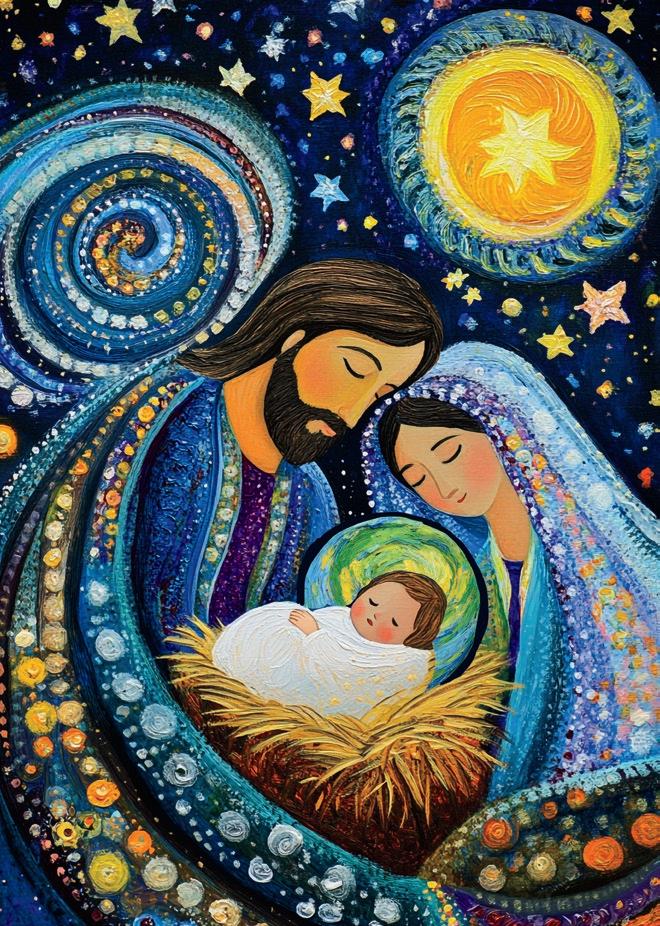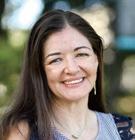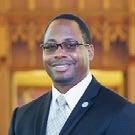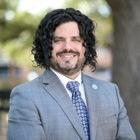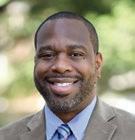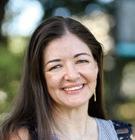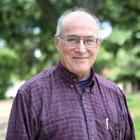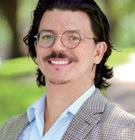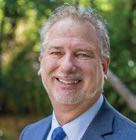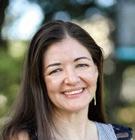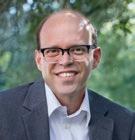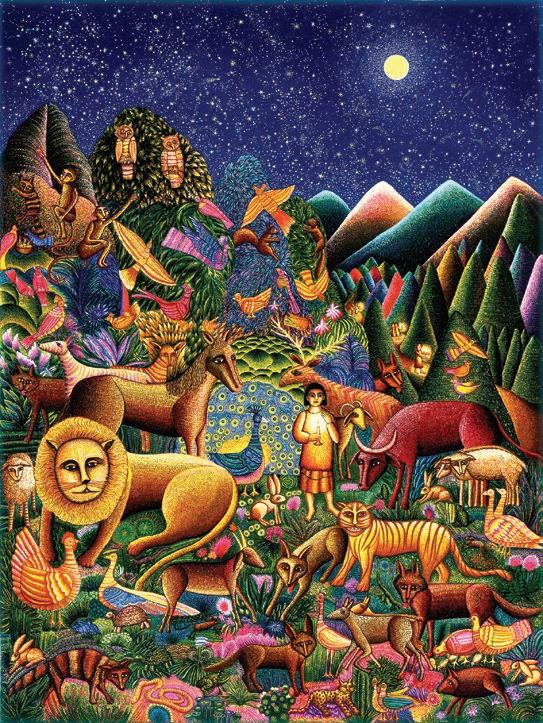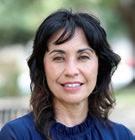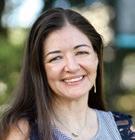TABLE OF CONTENTS
Sunday, November 30, 2025
Matthew 24:36–44
Rev. Dr. Patricia Bonilla Assistant Professor of Christian Education
In the Days and Hours of Uncertainty
This passage from the book of Matthew presents the reader with feelings of fear and uncertainty as the eschatological promise prolongs. However, the passage is not intended to be a doctrine of the “delay of the Parousia,” which can paralyze us in passive waiting. Rather, the evangelist issues both a warning and a mandate: followers of Christ must remain vigilant.
The call is to radical discipleship and courageous witnessing of the present, and a visioning of the future in the coming of the kingdom of God. For Matthew, the Son of Man will come and reverse the tables, ushering in God’s will on earth. It is a falling away of an old order and the anxious expectation for a new order in which we are invited to participate. This is the good news! We are reminded of God’s invitation to a form of discipleship that requires us to always be vigilant. Not a complacent or apathetic “business as usual” discipleship but one that requires our prophetic witness, at a time when some in our communities are “taken” and others left behind. In an Empire unraveling, these fears are very much real, manifesting as masked individuals hiding in plain sight.
And yet, these parables of warning do not leave us without hope. The Matthean community is not urged toward passivity, but toward responsible, faithful action. The late Fred Rogers, beloved host of Mr. Rogers’ Neighborhood, once said that in times of crisis when it seems like bad and scary things are happening, “we should turn to the helpers.” In this Advent season, may we remember that God’s radical invitation to discipleship calls us to be those very helpers: the church at work in the “not yet” places of the world, witnessing with hope for the breaking in of God’s kingdom.
Monday, December 1, 2025
Isaiah 2:1-5
Rev. Phil Dieke Director of Congregational Innovation
I remember the first time I witnessed the majestic nature of the mountains. My high school senior trip was to Winter Park, Colorado. Our 50-passenger bus spent all night catching tumbleweed as we trekked across Kansas on Interstate 70. As dawn broke, I gazed through the windshield. I rubbed my eyes, confused by the strange clouds on the horizon. Then, it hit me—those weren’t clouds. The closer we got to the mountains the more my soul stirred. I was completely in awe.
Do you remember the first time you were in awe of God’s creation?
Isaiah’s vision begins with a mountain—majestic, towering, radiant with divine grandeur. In scripture, mountains often symbolize closeness to God. I used to think the mountain of the Lord was reminiscent of Mount Olympus, where God, like Zeus, sat elevated to rule over. Now, as I read this text, I imagine Isaiah wanted to inspire the same awe I felt when I first saw the Rocky Mountains. The mountain of the Lord rises above all others—not to dominate, but to inspire.
This invitation to awe and majestic wonder prepares us for Isaiah’s call to a better way of being—one where we recognize nature is not “other.” We are nature. As nature, we have the power to collaborate in the renewal of all creation, or to destroy it. A sword and a plowshare come from the same material. The question is: How will we choose to use that material?
If you need inspiration to answer that question, I suggest a trip to the Rocky Mountains.
Tuesday, December 2, 2025
Romans 13:11–14
Anna
Hernandez
Master of Arts in Youth Ministry, Senior
Wake Up to the Light
This passage follows Paul’s vision of what it means to live as a believer—to set aside selfish ambition for the good of others and to trust that God will provide what is needed. Here, Paul tells us why this kind of living matters. The time is urgent. Salvation is near. The light is breaking in, so we must wake up.
Paul is not simply urging a change in personal morality. He is calling us into God’s cosmic renewal. In Romans 8, he writes that all creation is groaning, longing to be set free from decay. Today, our world is aching under the weight of injustice, violence, and exploitation. To “put on Christ” is to see that pain clearly and refuse to ignore it.
Advent is not a time for passive waiting. It is a season of active anticipation where we are called to step fully into the light, to live as people who recognize what is broken in the world and dare to believe healing is possible. We are not meant to sleep through the suffering of others. We are meant to rise, to act, and to love boldly.
Creation is stirring. The darkness is lifting. God is calling us to live as people of the day, wide awake, clothed in Christ, working toward a world made new.
Wednesday, December 3, 2025
Rev. Dr. Sarah Allen, MDiv’07, DMin’19
Associate Dean of Ministerial Formation and Advanced Studies
God of love and light, Wake us up from our sleepy complacency. Stir our hearts, open our eyes to the promise of your salvation. Clothe us in the radiant armor of Christ, that we may shine your lifegiving love into the darkest corners of our world. Let our daily lives reflect your mercy and grace in all that we say and do. Amen.
Rev. Dr. David Gambrell, MDiv’98
Let All Mortal Flesh Keep Silence (PICARDY)
Text: From Liturgy of St. James, 4th cent.; trans. Gerard Moultrie, 1864, alt. Music: French melody; arr. Ralph Vaughn Williams, 1906
Thursday,December4,2025 (Zech.8:1-8,CEB)
Rev. Dr. Joe MacDonald, DMin’19
There is very little space separating our understanding of the Holy One between the ancient world and ours. In our Scripture reading, the prophet reveals a timeless message. God announces to the people that, in their darkness, the Divine will do incredible things. Those who struggle and feel displaced will return to their native land. God will restore the people to the land promised to them. In the end, the Divine will fulfill the hopes of those in captivity. The Holy One of Israel will lead them home.
The prophet Zechariah, whose name means “Yah remembers,” is a living testament to the fulfillment of God’s promise of restoration. Holy words echo across the known world, assuring everyone that they will return home and build new lives in the land flowing with milk and honey. This oracle is not just a promise, but a prophecy coming to life. Equipped with the promise of a new day, the returning settlers will flourish in the territory God provided for the Hebrew people.
We all know what it is like to feel separated and distant from the Divine. We feel lost and removed from the one source that brings us strength and renewal. And in the moments of our deepest despair, the God of our understanding surrounds us. Loving arms lead us to a place of rest in holy arms. We return home, to the place where we truly belong,
Scan QR code for music.
grateful to know that, once again, we have left the captivity of our souls and embraced the light of our incredible God.
Friday, December 5, 2025
Matthew 24:36-44
Rev. Dr. Ryan N. Arnold Vice President for Institutional Advancement
“Watch, be alert, keep awake.” Toward the close of Matthew 24, Jesus repeatedly urged his disciples to remain vigilant as they await the coming of the Son of Man. To emphasize the point, the imperative is illustrated by four examples of people surprised at the Lord’s arrival: the days of Noah, a pair of agricultural workers, two people processing grain, and a homeowner caught off guard by a thief.
The group of sayings is steeped in the milieu of first-century Jewish apocalyptic literature. While some commentators lean into end-time speculations, lest the metaphor replace the imperative, let us resist such foolish interpretations. The guidance is plain. We are to remain vigilant. “Watch, be alert, keep awake.”
Advent is a season of anticipation. We prepare our hearts and homes for Christ’s coming. We wait, we long, we sing the hymn written by Charles Wesley: Come, thou long expected Jesus, born to set thy people free; from our fears and sins release us, let us find our rest in thee.
On the day of the Lord, we are free, secure in the presence of the One. So, in the same way we long for loved ones estranged by distance, Advent reminds us to long for Christ’s presence.
Perhaps the early church anticipated an immediate return, and Matthew 24 addressed that perceived delay. Certainly, no distance feels greater than time. Yet two millennia later, and without irony, the imperative still jolts us from the rest we attempt to secure by other means. At the One’s arrival, the comforts afforded by generational wealth, prudent labor, or simple luck will not withstand the thief in the night. Therefore: “Watch, be alert, keep awake.”
Saturday, December 6, 2025
Isaiah 2:1-5
Rev. William West, MDiv’16 Director of Financial Aid
After my wife gave birth to our twin boys, a kind older woman approached me in the hospital. During our conversation, she shared a thought I will never forget: “When a lot of boys are born, war is on the horizon.”
Now, 13 years later, my wife and I have three boys, and wars are raging across the world. While her words, though well-intentioned, may hold some truth, they were rooted in fear and death.
In contrast, Isaiah delivers a message full of hope and life. Isaiah speaks of a new day characterized by peace, restoration, and the promise of God’s reign. We must continue to hold fast to knowing that the Kingdom of God is on the horizon. God, as the judge, will ensure justice and bring an end to the human desire to study war.
I must confess, it would be untrue to say that I rarely reflect on the words shared by the older woman. In fact, her words often occupy my thoughts. I find myself in tears at times when I consider them, especially as our children prepare to return to school, while countless others are suffering from hunger. The staggering cost of war is truly unfathomable.
In these challenging times, the spirit of Advent reminds us that one day peace will prevail. Until that day comes, for peace to manifest, I must first lay down my sword and shield and study war no more.
Prepare the Way
Sunday, December 7, 2025
Matthew 3:1–12
Awrish Javid, Master of Divinity, Senior
Let us reflect deeply on the powerful verses of Matthew 3:1–12. John the Baptist emerges as a voice crying out in the wilderness, not to frighten, but to awaken. His call to repentance was a bold wake-up call for the people of his time, and it remains just as urgent for us today. John wasn’t seeking to condemn; he was preparing hearts to receive Christ, the One who brings light into our darkness.
John, with boldness and humility, called people to turn their lives around, to prepare a path in their hearts for the Savior. He lived a simple life, but his spirit burned with
purpose. People came from all over to confess their sins and to be baptized, drawn not by his words, but by the hope he carried.
This Advent season, I invite you to pause and reflect: What in your life needs preparation? What in your heart needs clearing? How are you making room for Jesus? If you have already received the Holy Spirit, how is it visible in your actions, your love, your priorities? Advent is a time of holy anticipation, not passive waiting, but intentional preparation. In this season, let us return inward, to reflect, to realign.
Let us prepare the way not only with our words, but with how we live, love, and serve. May the Holy Spirit ignite us anew, that we may be ready to receive the One who is greater than us all.
Blessings of the Advent season to you and your loved ones.
Monday, December 8, 2025
Isaiah 11:1–10
Rev. J.D. Herrera, MDiv’15
Vice President of Enrollment Management and Student Success
“A shoot shall come out from the stump of Jesse …”
Have you ever looked closely at a tree stump? Dead. Flat. Final. That is where Isaiah starts— not with a sunrise or a song, but a stump. And then, out of nowhere, a shoot. A green whisper just bold enough to break through death. That is Advent.
This image is so familiar it nearly becomes background noise. But pause. The stump is not nostalgia—it is defiance. The Branch is a bold claim that something long dormant can still hold life.
This text names the messy, gorgeous work of divine co-creation. It is not merely a prophecy about someone who will come—it is a blueprint for what we are meant to become.
Growing up in Miami, Christmas came with warm, summer-like temperatures. As kids, we would get sent outside to play in my grandparents’ desolate backyard with nothing more than a huge, flat tree stump. Using our imaginations, we would bring fun and life out of that stump—making it a table, a stage, a fortress.
That is where I connect with Isaiah. How does a stump help us find joy? The same way hope works. As a descendant of immigrants, I know what it is like to live inside promises that ancestors believed in long before they made sense. They moved for what could be.
Isaiah calls us into a radical vision: wolves lying with lambs, justice rooted in righteousness. It scares even as it beckons. Advent is not passive. It is active—showing up to the work of hope, even when it looks like a stump.
So, we go to places like desolate yards and work to find joy and fun. We stretch toward light that has not yet dawned. We grow with and not against the promises whispered by those who came before us.
Come, O Branch. Come, Lord Jesus. And may we have the guts to grow with You.
Tuesday, December 9, 2025
Romans 15:4-13
Dr. Rodney Caruthers Assistant Professor of New Testament
Paul’s Decentered Perspective
Self-preservation and self-centeredness are natural psychological reactions, especially when confronted with personal dilemmas. Only prioritizing self-interests, however, may inadvertently diminish one’s interest to intervene in other’s calamities. The constant barrage of an increasingly negative news cycle that highlights political conflicts, violence, and suffering may also contribute to desensitization. Critical reflection is necessary to balance personal matters with the surrounding social disparity.
Paul sees the self-centeredness of some community members as being antithetical to Jesus’ teachings (Rom 15:1–6). He argues that more concern should be directed toward weaker (adunatos) community members (Rom 15:1–2). For Paul, Jesus’ fulfillment of Psalm 69:9 should be reason enough to change their attitude and behavior. Paul’s call to action is connected to his belief that the scriptures were written for didactic purposes (Rom 15:4). What was written long ago could also double as a maxim to live by. Although Psalm 69:9 contextually had nothing to do with building up the weak, Paul reappropriated it to challenge their perspective of social interaction. This short passage from the past was used rhetorically to “renew” how they viewed themselves and others.
Just as the teachings of scripture and the life of Jesus were used to alter the Roman Church’s perception of social interaction, they can also function in the same way for modern congregations. During the busyness of the holiday season, it can be therapeutic to pause and reflect on ways to improve our social interaction. One idea to further contemplate is how our reasoning and conduct aligns with Jesus’ teachings, not only towards those in need, but in every relationship.
God of hope,
Wednesday, December 10, 2025
Rev. Dr. Sarah Allen, MDiv’07, DMin’19 Associate Dean of Ministerial Formation and Advanced Studies
In this holy season of waiting, we rejoice in the promise of Immanuel. Let our praise rise to you like incense, as we join the ongoing song of angels and prophets. Teach us to welcome the stranger with the open arms Christ extended to us— when we, too, were strangers to your love. In a world too often divided, make us signs of your peace, living in harmony, bearing one another’s burdens. As we wait with expectant hearts, fill us with all joy and peace in believing. In the hope-filled name of Christ, Amen.
Thursday, December 11, 2025
Psalm 104:1-13
Rev. Ted V. Foote, Jr., MDiv’79 Professor in the Louis H. and Katherine S. Zbinden Distinguished Chair of Pastoral Ministry and Leadership
Hymn 625 in Glory to God: The Presbyterian Hymnal is the Swedish hymn, “How Great Thou Art.” The note below the hymn explains there have been small translation edits across the years. For example, in stanza 1, the phrase “worlds thy hands have made” originally was “works thy hands have made.”
This Advent devotional book’s theme, “The Renewal of All Creation,” and Psalm 104:1–13 were on my mind as I visited 50 acres of farmland in central Texas this past July. In my 72 years, I have walked, camped, fished, helped with chores, and played on that farm too many times to remember. Never, though, in late July, have I seen so much green grass and the two large ponds filled to capacity with water.
This summer included the waters, “which God gives,” rampaging through the Texas hill country in quantities and with destructive power not experienced in recorded history, begging the question: Did God cause that with the waters? Or, did waters God once brought into being do that meteorologically in a deluge of immense proportions?
People, other mammals, birds, insects, fish, reptiles, and amphibians are, together, part of creation, as is God, mysteriously. If the writer of Genesis 1, the psalmist of 104, the lyricist of “How Great Thou Art,” and innumerable others can write poetically about God and God’s creation, then, as we ponder the mysterious embodiment of God’s wisdom and love in Jesus, born of Mary, we also can consider with awe God’s grace initiating the renewal of all creation continually, including each person: you, me, and all.
Friday, December 12, 2025
Matthew 3:1-12
Dr. Ángel Gallardo Assistant Professor of Church History
John the Baptist emerges from the Judean wilderness, calling Israel to repent because “the kingdom of heaven has come near” (Mat 3:2). Historically, this proclamation echoed prophetic traditions anticipating divine intervention to renew not only human hearts but the entire created order. John’s location matters because invoking the wilderness situates our imagination within Israel’s formative experiences: freedom from bondage in Egypt, overcoming exile in Babylon, and the generations-long struggle to preserve hope for a restored homeland.
John’s imagery—axes laid to tree roots and unquenchable fire (v. 10, 12)—draws upon ancient Near Eastern symbolism for divine purification and judgment. Yet, these metaphors do not imply mere punishment for human rebellion. Rather they signal preparation for renewal, indicating that the awaited Messiah would restore creation’s original harmony disrupted by sin and injustice.
Moreover, John’s call to repent and be baptized is an invitation to join God’s plan to restore all things. Baptism goes beyond individual salvation. John announces a Messiah whose coming promises renewal beyond personal morality, extending to social relationships, justice, and humanity’s stewardship of creation. For God’s people, repentance historically involved turning from corruption and planetary abuse to communal justice, care for the land, and harmony with neighbors.
This Advent reading invites us to reflect on historical patterns of human brokenness— socially and ecologically—and calls us toward active participation in God’s promised renewal through an ongoing process of repentance and discipleship. As John urged his audience to bear good fruit (v. 8), so today we are called to align our lives, our families, our institutions, our money, and our politics with God’s vision for a creation restored.
Saturday, December 13, 2025
Isaiah 11:1-10
Gary Mathews Director of Alumni Relations
Isaiah 11 intensely imagines a renewal of creation brought forth through the Lord’s righteousness. This renewal will bring together wolf and lamb, leopard and cub, calf and lion, cow and bear, you and me. This renewal provides hope for all people in circumstances lacking peaceful harmony.
Evocatively, Isaiah adds, “a little child shall lead them.” A child leading the masses hints at the nativity as well as Jesus’ invitation, “let the little children come onto me.” The renewal envisioned by Isaiah parallels Jesus insisting that to discover spiritual renewal one must
be born anew/again. You may have heard an iteration of a story about a young child who anxiously anticipates the home arrival of a new brother. At the first moment possible, the child implores the baby, “Please tell me about God, because I’m beginning to forget.”
How do you prepare to approach God’s dwelling? Do you resonate with the prey of this text—seeking a renewal of trust and confidence before sitting at the table with your hunter? Or do you resonate with the hunter—hoping to shed both innate and learned biases to neither “hurt nor destroy” on God’s holy mountain? Do you approach with the innocence and awe of a child or with the wisdom and experience of an adult?
In our Advent awaiting, we likely require all the above for renewal—a vital renewal that keeps us inquiring about our God so that we do not begin to forget.
Sunday, December 14, 2025
Matthew 11:2-11
John Curran, Master of Divinity, Senior
In our scripture reading for today, we see John the Baptist question whether Jesus, the Messiah, is the one who was to come or if he and the disciples were to wait for someone else. In his questioning, John, who is in prison, sends the disciples to inquire. Jesus tells the disciples to return to John and tell him all the acts of renewal and restoration they’ve seen Jesus commit.
Part of why I think John questions whether Jesus is the Messiah they’ve been waiting for is because as a prophet, John is concerned with judgement and justice. I also wonder if John is feeling a little impatient, because he is imprisoned and wants justice avenged against Herod.
As we think about our own socio-political context, we may find ourselves, like John the Baptist, yearning for justice and judgement; and that’s completely understandable. We are living in a divided world that is rife with injustice, violence, inequality, and exploitation. While I firmly believe we, as people of faith, are called to the work of justice, I also think we would do well to focus on living out a similar ministry to Jesus and engage in the redemptive work of restoration and healing.
We are often led to believe that small acts of grace do not bring about the renewal of creation. But, during this Advent season, I would invite us to challenge that understanding. Any kindness we extend holds the potential to move creation away from focusing on how the world is today, and toward the renewal we wait for in the coming of Christ.
Monday, December 15, 2025
Isaiah 35:1–10
Dr. William Greenway Professor of Philosophical Theology
Advent is daring, unrealistic, idealistic, expectant, even—despite colonial horrors (remember Herod slaughtering infants)—joyful anticipation of the Messiah, the Christ, wolf living with lamb, righteousness covering the earth.
Advent is “already/not yet” in Jesus. “Already” wherever we are gathered in shalom— peaceful communion secured in gracious love. “Not yet” whenever we claim, grasp, or kill in the name of “my place under the sun” (Pascal). “Not yet” whenever we “forget God.” For Torah and the prophets, “forgetting God” does not mean forgetting ritual praise and worship, it means forgetting the poor, the alien, the widow (Isaiah 1).
For Isaiah, the context is Assyrian invasion and Babylonian exile. For Jesus, imperialism and the violent pax of Romana. Today, in the land of the Canaanites, where Abram, a Chaldrean from Ur, was called to be a “blessing to all families on earth” (Genesis 12), the context is generations of Palestinian and Jewish “river to sea” violence. Today, across the globe, the context is exploitation, economic enslavement, Gilded Age-level inequity, mass displacement, widespread violence—all to secure “my place under the sun.”
Common to Isaiah, Jesus, and us? Suffering; immiseration; fearful, wrathful, and greedy turns to violence; hatred building hatred; vengeance stoking vengeance.
The response of Isaiah 35? Hope in gracious love: “Say to those who are of a fearful heart, ‘Be strong, do not fear!’ For waters shall break forth in the wilderness…the ransomed of the Lord shall return and come to Zion with singing; everlasting joy shall be upon their heads; they shall obtain joy and gladness, and sorrow and sighing shall flee away.” Daring, unrealistic, idealistic, expectant, even joyful anticipation of shalom incarnate.
Tuesday, December 16, 2025
James 5:7-10
Rev. Alan Constant, MDiv’22 Learning Specialist
The season of Advent invites us into a sacred kind of waiting—one that is not passive but about opening our hearts in faithful and expectant hope. I am reminded of my friend, a farmer, who once described the feelings she has watching the cold earth, trusting that beneath the surface, life is already beginning to stir. James calls us to this kind of patience—not just for ourselves but for the healing of the world.
This kind of waiting is not easy. I am impatient. I want action. I ask, how can I wait when injustice drags on, when grief lingers longer than I imagined it would or should, or when the healing I so desperately pray for comes more slowly than I would like? In such moments, I long for some sign that God is still tending, still mending creation. James
reminds us of the prophets—those who held fast to hope, not because things were easy, but because they trusted that God’s promises were still unfolding. Friends, the renewal of all creation is already underway—quietly and faithfully, like roots remaining active deep in winter. Advent invites us to wait with courage, resist despair, and prepare our lives for the new creation God is bringing into being.
So, this season, let us wait together—not in fear, but in trust. Let us dare to believe that Christ is coming—not only to bring joy and comfort, but to make all things new.
Wednesday, December 17, 2025
Rev. Dr. Sarah Allen, MDiv’07, DMin’19
Associate Dean of Ministerial Formation and Advanced Studies
Today’s prayer is a centering prayer.
You are encouraged to find a quiet space and set aside between two to three minutes for this prayer practice. If you are new to centering prayer, you may wish to set a timer for one to two minutes as you begin the practice of centering your heart and mind to hear God’s voice.
1. Choose a word to focus on from the week’s scriptures. Some examples are: patience, love, hope.
2. Close your eyes and take several cleansing breaths, asking God to quiet your mind and heart as you pray.
3. With closed eyes, recite your focus word as your prayer to God. If other thoughts arise, let them simply drift past you as you return to your focus word.
4. After a few minutes (or when your timer rings), give God thanks for this time and slowly return to your day. Pay attention throughout the day to how and when your focus word reveals itself in your life. Amen.
Scan QR code for music.
Rev. Dr. David Gambrell, MDiv’98
O God, Show Mercy to Us / Psalm 67 (THAXTED)
Text: The New Metrical Version of the Psalms, 1909, alt. Music: Gustav Holst, 1918; harm. Composite
Thursday, December 18, 2025
Colossians 1:15–20
Rev. Dr. Carolyn Helsel
Associate Professor in the Blair Monie Distinguished Chair in Homiletics and Project Director of the Sharing Faith Initiative
“Why the heck would I want to save that creature?!” I exclaimed as my son showed me an image of a microwhip scorpion he had photographed in our backyard. Smaller than a grain of rice, and looking like an outer space alien, this tiny arachnid did not inspire sympathy. It was not a cuddly-looking polar bear cub on a melting ice cap. Nonetheless, my son insisted that it was a sign of positive habitat cultivation because karst invertebrates (a new word for me) were indicators of a healthy ecosystem.
Our conversation was sparked by my suggestion to call an environmentally-friendly pest control company to spray for chiggers in our yard. In protest, my son showed me that photo, taken two years ago, and said, “Any pesticide that kills ants or chiggers will kill this creature, too,” in which I responded, “So what? Why should I care?”
He argued that karst invertebrates help identify pollution in water—when they die off, the water is not safe to drink. Therefore, signs of biodiversity like this hard-to-spot karst invertebrate are positive reminders of the connection between humans and the resources we depend on, such as water. The healthier our small piece of land, the better we can contribute to the health of our waterways.
Thus, my son’s passion to preserve this arachnid was a reminder that taking care of small creatures is a way of helping us tend to the body of Christ. This text in Colossians speaks of Jesus as intimately connected to all of creation—the firstborn of all creation—and the head of the body, the church. And through Christ, all of creation is reconciled to God, even in the midst of our sinfulness.
Friday, December 19, 2025
Matthew 11: 2–11
Dr. David H. Jensen
Professor in the Clarence N. and Betty B. Frierson
Distinguished Chair of Reformed Theology
We live in self-referential times. Social media posts amplify our profiles, highlighting our opinions, activities, and even our meals. Political leaders talk about themselves to win elections and cling to power. Our consumer society considers self-interest to be good, so we are encouraged from an early age to assert ourselves to gain the benefits of this society. If we don’t speak for ourselves, who will?
In this remarkable passage, John’s disciples ask Jesus a direct question. They ask him to speak for himself, to claim his identity as the Messiah: “Are you the one who is to come, or are we to wait for another?” But instead of speaking about himself in response, Jesus draws attention to others, to those who suffer because of disease, infirmity, and
economic oppression. Is this an artful dodge of the question? Or is it the heart of the Way of Jesus and his identity as the Messiah?
What happens in this vignette happens over and again throughout the synoptic gospels: Jesus proclaims relatively little about himself while he teaches, shares, heals, and reconciles so that others are embraced by his ministry. In Matthew, Jesus is otherreferential, even when pressed to claim his own identity boldly. In this season of Advent, as we wait for the One who redeems all creation, may we follow in His Way. Jesus’ indirect answer in this passage not only shows us who Jesus is, it also reveals the shape of the Christian life, where all are welcome.
Saturday, December 20, 2025
Isaiah 35:1-10
Rev. Dr. Philip Helsel Associate Professor of Pastoral Care
After finishing seminary, my wife Carolyn and I worked for a year in the desert city of Yuma, Arizona, serving as clinical pastoral education residents. We were sometimes exhausted by the grueling schedule of overnights, patient visits, and evaluation. Due to unseasonable rains, the desert transformed remarkably. Yuccas and cacti bloomed, and the ground was covered with unspeakable beauty. The miles of blossoming desert seemed to offer a message of strength.
Isaiah proclaims a renewal of wonder in his own dry environment, and he envisions it as refreshing a wounded and longing people. He imagines God as a great King over heaven and earth, restoring all things. God brings about an intensification of nature’s glory, a strengthening of God’s people over their enemies and a final imagined return home for the exiles. The transformations wrought on a desert landscape by rain are like images of God’s faithfulness, abundance, and steadfastness in a surprising event of grace.
Not only is God strengthening nature by intensifying it, but God also provides a safehaven and safe-passage for those traveling in the midst of trying experiences. Perhaps speaking to the return from Babylonian exile, Isaiah imagines a road through the wilderness that is free from all violence and points toward home.
This Advent, we can spend time wondering at the message of Isaiah for all thirsty deserts, imagining what joy might bloom. We can also imagine the original context of Isaiah’s Jewish audience and also Christian Advent readers today, overhearing good news about the renewal of all creation as a sign of God’s glory and steadfast love.
Sunday, December 21, 2025
Matthew 1:18-25
Rev. Sean Watkins Associate Dean of Lifelong Learning
The incarnation announced in Matthew’s birth narrative represents nothing less than God’s radical intervention to renew all creation. When the angel declares that Mary will bear Emmanuel—God with us—we witness the divine entering human flesh to restore what has been broken.
Black missiology offers profound insights into this renewal. The God who enters our world through a vulnerable, displaced family understands marginalization intimately. Jesus is born into a context of imperial oppression, economic hardship, and political instability—circumstances that resonate deeply with communities experiencing systemic injustice. The incarnation thus becomes not merely spiritual salvation but God’s solidarity with the oppressed.
Joseph’s righteous response—choosing protective love over social convention—models the kind of justice God seeks. His willingness to embrace God’s unexpected plan mirrors how we must respond to divine calls for transformation, even when they challenge established norms.
This renewal extends beyond individual salvation to encompass all creation groaning for liberation (Rom 8:22). The incarnation inaugurates God’s kingdom where the last become first, where justice flows like water, and where every valley is lifted up. As Presbyterian seminarians, we are called to proclaim this holistic gospel—one that addresses both personal transformation and systemic change.
Emmanuel reminds us that God has not abandoned creation but entered it fully, committed to its complete restoration. In our ministry, we carry forward this mission of renewal, working for justice while trusting in God’s ultimate victory over all that diminishes human flourishing.
Monday,December22,2025
Isaiah7:10–16
Rev. Dr. Donghyun Jeong
Assistant Professor of New Testament
In the previous passage (Isaiah 7:1–9), the kingdom of Judah is under threat, as enemies are coming to attack Jerusalem. God sends the prophet Isaiah to King Ahaz of Judah, urging him to stand firm in his faith, since the alliance of the enemies will ultimately collapse. Today’s passage (7:10–16) continues this message, offering God’s promise of a sign. Yet, Ahaz, surprisingly, rejects it (vv. 11–12). Isaiah interprets Ahaz’s response as an expression of unbelief and stubbornness (v. 13). Despite refusal, God provides a sign: the
birth of a child named Immanuel (meaning “God with us,” v. 14). The growth of this child will serve as a marker of time, signaling how soon God’s plans will be realized (vv. 15–16).
A friend of mine, who became a father during the COVID-19 pandemic, once told me that his child’s birth felt like a sign of hope when the world around him seemed to be falling apart, hopelessly. Isaiah’s text does not specify the identity of the promised child or the mother, though the Gospel of Matthew later interprets the fulfillment of the Immanuel promise in the birth of Jesus (Matthew 1:22–23). During Advent, we celebrate the arrival of this unique child, Jesus. Yet, the passage also opens our eyes to see God’s ongoing work. Even when, like Ahaz, we resist recognizing God’s sign of renewal—whether out of fear, despair, or unbelief—God continues to move ahead of us, offering glimpses of God’s renewal of us, our churches, and all creation. The most unexpected shall bear a child, and we shall name the child “God with us.”
Tuesday, December 23, 2025
Romans 1:1-7
Ryan Obray, Master of Divinity, Senior
I currently have nine self-help audiobooks downloaded on my phone. I love listening to them on walks and car rides because they help me to reflect on how I can grow as a person, which humbles and excites me. As many books begin, the author states who they are and why they are the expert on the topic, basically, “Why you should listen to me.” Paul follows this same style of introduction at the beginning of all his letters. He states who he is, an apostle, and why we should listen to him, he has been called by God.
In Romans, Paul attributes his authority to his calling from Jesus Christ, not his achievements or wisdom. His calling is to be set apart and transformed by the Holy Spirit, this is a calling we get to share in! Unlike what many self-help books proclaim, our transformation does not come from doing more or trying harder, it comes from the Holy Spirit transforming us into the image of Christ. As Romans 12:2 reminds us, this transformation is a process and a constant renewing of our minds so that we can be in better alignment with the gospel we have been called to. We will never be fully perfect in this transformation, no matter how hard we try. As self-help book critic Kate Bowler states, “Perfection is impossible, but transformation is not.” While we can continue to enjoy self-help books and learn new ideas and habits, we can rest knowing we are not called to be perfect but called to be transformed through the Holy Spirit’s power at work in and through us.
Wednesday, December 24, 2025
Rev. Dr. Margaret Aymer
Vice President for Academic Affairs and Academic Dean and The First Presbyterian Church, Shreveport, D. Thomason Professor of New Testament Studies
“Peace on earth” declares the army of heaven at the birth of the Christ child. Ancient ears would have registered the irony. Peace, after all, was the claim of the imperial Roman occupation. Augustus Caesar was the bringer of peace to the Empire. Yet Luke’s story illustrates the disruption caused by this “peacekeeping” ruler. A royal fruit-basket-upset ensues, as all head to their ancestral homes to be counted, in anticipation of paying even more tax to the occupiers who claim ownership of their ancestral lands.
Neither Joseph nor his betrothed, heavily pregnant Mary would have experienced the physical or economic demands of travel to Judea as “peaceful” or “peace-bringing.” Displaced, forced to migrate, they must lodge in a home so full that not even a birthing mother could be accorded with the privacy and quiet of the upper room (not the inn as so many translations have it). Jesus comes into the world in chaos, born amid the cries and strains of his mother; he lies not in a gilded cradle but in a feeding trough for the family’s animals.
Yet amid this chaos, we hear a declaration of divine peace. Peace to the people on whom God’s good pleasure rests, yes. And, more broadly, peace on earth, peace on the world that God so loves. For God’s peace does not rely on human activity or power. God’s peace falls on shepherds and their sheep, frogs and flies, night birds singing their haunted song, and house mice watching for a falling crumb.
May God’s peace rest upon and renew this God-beloved world, this Christmastide and forever more. Gloria in excelsis Deo!
God’s peace does not rely upon human activity or power.
Thursday, December 25, 2025
John 1:1–14
Rev. Denise Nance Pierce, MATS’11 Board President, Austin Seminary
In this passage, verses four and five stand out this Christmas morning: In Him was life and that life was the Light of mankind. And the Light shines in the darkness and the darkness did not grasp it. John 1:4–5, NASB
From forever ago, and forever more, Jesus embodies Light. As the Light of mankind, Jesus illuminates, warms, grows, brightens, lifts, nurtures, supports, and reflects all creation. He is in all things; through all things; before all things; and in Him, all things hold together with Light, as Light, and for Light.
Today, we are invited to behold that Light. The marvelous, beautiful, and breathtaking Light of the World who is, at once, the Light at creation, the Light of the Hebrews, the Light in the manger, the Light of the cross, the Light of resurrection, the Light of ascension, and the Light who will return.
As darkness threatens to engulf this world, you and I must bear witness to the Light who is Jesus. John the Baptist elevated the Light in the wilderness. Like him, we must dispel the darkness in our world by elevating the Light. As Rev. Dr. Martin Luther King, Jr. said, “Darkness cannot drive out darkness, only light can do that.” Only Jesus, shining through you and me, can drive out darkness. So, beloved, behold the Light of Jesus in the manger today and bear witness to the Light always.
In Him was life and that life was the Light of mankind. And the Light shines in the darkness and the darkness did not grasp it.
John 1:4–5, NASB
Friday, December 26, 2025
JA Swanson
PEACEABLE KINGDOM
Copyright 1994 John August Swanson Trust
Serigraph, 30” x 22.5”
https://JohnAugustSwanson.com
Spend a few moments looking closely at this painting by J.A. Swanson. Breathe deeply as you settle into the vibrant colors and image of the glowing moon. Use these reflection questions to guide your focus and prayer on this day after Christmas.
1. Where do you see peace reflected in this painting?
2. What do the humans in the painting hold in their hands? What might this symbolize?
3. Why might Swanson have chosen a starry night rather than a bright noon?
4 How is the renewal of all creation reflected in J.A. Swanson’s painting?
Saturday, December 27, 2025
Isaiah 7:10–16
Dr. Suzie Park Associate Professor of Old Testament
It is easy to look at the world through blue colored glasses. To find ample evidence that things are wrong and awry. The world seems like a mess, and it feels like these trying and nonsensical times will last forever.
In this well-known passage, God proclaims, through the prophet Isaiah, that the end of difficulties is near, despite evidence to the contrary. In doing so, this passage reminds us that all conflicts and challenges, even ones that seem interminable, eventually do come to an end. Neither good times nor bad times last forever.
To authenticate this message, the prophet Isaiah points to a sign: The imminent birth of a special child to a young lady, mistranslated as a virgin by the writer of Matthew (1:23). This special child is given a meaningful symbolic name, Emmanuel, which means “God is with us.”
With this name, scripture reminds us of a simple yet profound truth: God is present with us, indeed all around us. Open your eyes and look around; the biblical text whispers: every daredevil squirrel, gem-like flower, meringue cloud—all that you encounter— silently shouts of the presence of God, who is with us, all around us, of Emmanuel.
Sunday, December 28, 2025
Isaiah 7:10–16
Tony Harris, Master of Arts in Youth Ministry, Senior
Have you ever asked God to renew your peace when chaos was around you? Matthew 2:13–23 is the definition of chaos happening to someone. Imagine having a newborn that you love and adore and then discovering that appointed officials want your baby dead. This would not feel peaceful—but horrifying.
Mary and Joseph’s emotions must have been a wreck with fear running amuck, and yet, in the midst of the chaos, God provided peace. Angels came to Joseph and told him exactly what God wanted him to do. He listened and went to Israel as God instructed. This did not erase his fear, if anything, it probably made him follow God’s instructions even faster.
Peace is not erasing the situation around us; it is finding solutions to deal with the situations in front of us. Joseph, here, has cracked the code to finding peace: Listening to God! Herod was still chasing him and did terrible things, but amid feelings of extreme peril, God gave Joseph’s family a way through the chaos.
I hope you are not facing the same situations as Joseph, but bad leaders, unjust
treatments, and fear will always exist. How do you best listen to God? What activities can you do during times of stress to feel renewed? Can God’s presence in the past give you faith that He will show up for you? Joseph heard from God by sleeping. Go to God in times of stress and know that God can renew your peace.
Monday, December 29, 2025
Isaiah 63:7–9
Rev. Dr. Cynthia Rigby
W.C. Brown Professor of Theology

On Sunday evenings, as I made my way home to Princeton Seminary from my student field placement at the Community Presbyterian Church in Edison, N.J., I frequently wept. It is hard to explain why. It did not seem to be sourced by my own sense of passion or pathos generated by reflection on the work of the day. It was evoked from outside myself, a symptom of being pierced to the marrow by someone who knew not only my every thought, but my every intention. I felt like I was being “ambushed” (Currie) by a grace that was too near, that cared too much about how I lived my life, and that made me essential to the work that was all God’s. In those moments, I had the uncanny sense that I was both righteous and a sinner, both capable of the infinite and utterly incapable, all while feeling the peace that comes from being fully enclosed in the hollow of God’s loving yet deliberate hand. Like the children of Israel, I experienced God’s unmediated presence. But God came to me on Interstate 95 south instead of Mount Sinai.
I found solace from the grace at Denny’s, where I would go with my friends, Bill and Janet, to debrief over pancakes. We would analyze our worship leadership and parse our interactions confidently, with what many might identify as the bravado of youth. However, if you listened carefully, you would have heard notes of surprise and wonder that revealed our confidence was not the stuff of hubris, but of faith. Such faith is, really, surplus grace—the capacity to claim the promise that the God who is Emmanuel has a stake in what we become and will personally pick us up and carry us through our distress and into our salvation.
Tuesday, December 30, 2025
Hebrews 2:10-18
Rev. Dr. Crystal Silva-McCormick, MDiv’10 Assistant Professor of Missions and Evangelism and Director of Latinx Studies
The First Nations Version of the New Testament characterizes the aim of Jesus’ sacrifice as an act “to heal our hearts and our broken ways.” Author Patty Krawec argues that our “broken ways” stem from our unwillingness to see that we are related—that all humanity and the whole created order belong to God, and that we belong to one another. She says, “the question has never been whether we are related,” but instead how we live out our relatedness.
When our neighbors are suffering, and we fail to suffer with them, and fail to disrupt the power and principalities that are causing their suffering, we fail to live out our relatedness.
The reality of our broken ways is apparent in the genocide of the Palestinians of Gaza. This ongoing genocide reveals our inability to bear the pain of what is happening to our siblings across the globe—to live out our relatedness. We failed to seek to end their suffering and instead found justifications for the violence that decimated their lives and livelihood. To bear witness to such incomprehensible violence, and meet them with apathy or justifications, is a crisis of the heart.
The scriptures remind us that Jesus’ sacrifice sets us free from our broken ways; thus, Jesus calls us to live into our relatedness.
May we follow the Messiah who suffers with those who suffer, who took suffering upon Himself, and whose sacrifice heals our hearts and our broken ways. This Advent, may we follow the One who calls us to suffer with Gaza and to disrupt the powers and principalities that wield violence; in doing so, we can live out our relatedness.
Evans, Terry M., ed. 2021. First Nations Version: An Indigenous Translation of the New Testament. Downers Grove, IL: InterVarsity Press.
Wednesday, December 31, 2025
Rev. Dr. Sarah Allen, MDiv’07, DMin’19
Associate Dean of Ministerial Formation and Advanced Studies
God of wonder and grace, We rejoice that you draw near in Jesus— born to share our flesh, our joy, our sorrow. Shine the light and life of Christ within us, not only in this holy season, but in every day that follows, until the world reflects your kin-dom, where love reigns and peace abides. Amen.
The Chancel Choir of First Presbyterian Fort Worth singing He Is Marvelous by Rosephanye Powell; Soloist: Steven Latham. Piano: Dr. Ahreum Han Congdon; Conductor: Rev. Dr. Michael Waschevski, DMin’03
Scan QR code for music.
Thursday, January 1, 2026
Revelation 21:1-6a
Dr. Andrew Zirschky Director, Master of Arts in Youth Ministry and Research Professor in Youth Ministry
Our cultural imagination paints eternity as an upward journey where someday we will arrive at the pearly gates and ascend into heavenly bliss. However, in this passage, the Revelator presents a surprising twist: God’s holy city descends to earth, the Creator condescends to dwell among creation.
While many modern Christians obsess about being snatched away from a doomed planet, the Biblical vision points in precisely the opposite direction. Revelation 21 boldly declares that God’s home will be “among mortals” and that divine glory will dwell with humankind, not whisk humanity away.
In Advent and Christmas, we get a foretaste of this profound truth. In the infant Jesus, Heaven touches Earth, the first glimpse of the great renewal ahead. The child in the manger signals God’s choice not to whisk away the faithful, but to lovingly heal and restore creation right where we are.
This season calls us not upward, but outward—to see signs of new creation all around. Even now, Heaven is coming to Earth: in courageous acts of mercy, stubborn works of justice, communities of peace, small kindnesses, and in all acts that defy the reign of hatred and cruelty. Christ’s birth is but the beginning, the birth announcement of a new reality in which Heaven will continue to spill into Earth until God brings all things to completion.
This Advent, may we trade fantasies of escape for the wonder of incarnation, embracing a God whose love descends to us, who draws near, and makes a home among the ordinary and the overlooked, the downtrodden and the destitute. This God calls us to tangibly participate in the announcement: Heaven is coming to Earth.
Friday, January 2, 2026
Matthew 2:13–23
Estela Sifuentes, MDiv’19 Assistant to the Vice President of Finance and Administration
Joseph was a man of faith who believed in obeying the laws of that faith. When a messenger from God provided Joseph with guidance and instructions pertaining to the birth of Jesus, his faith helped him to believe and obey. His faith led him to follow God in ways most men would not. Joseph took on the responsibility of raising a child that was not his own, which is a difficult task, but maybe Jesus was not as difficult as most children. Being a stepparent can be challenging at best, but when you do it with faith and love, as Joseph did, it can be a rewarding experience for both parties.
God sent his only Son to create a new world, but humans got in the way, thinking they knew more than God, as we humans often do.
I believe Joseph helped form some of how Jesus saw the world as a child. Maybe Jesus used that formation to teach his disciples, and us, how to make our world new by practicing radical hospitality to our neighbors, near and far. When we choose to follow the carpenter’s son, we not only respond to Christ’s love and forgiveness by serving our neighbors, but that response helps us to respect each other so that together we can create a world where kindness, compassion, and respect guide us to care for each other and all God’s creation. When we follow Joseph’s example of caring, and loving each other, we can help recreate God’s creation, in all its forms.
Saturday, January 3, 2026
Isaiah 63:7-9
Rochelle Henderson, Master of Divinity, Senior
When we refuse to learn a lesson, it repeats itself until we finally do. The lesson may refashion itself, slightly, but rest assured it will be the same exact lesson. The lessons we encounter in daily life and the lessons we encounter in our Christian faith are often at odds with one another. We learn the lessons of God’s great love for us and that we are to love one another. Yet, the world enlightens us to lessons of suffering and cruelty against fellow humanity. We seek justice and mercy, while the world seeks money, power, and prestige.
Suffering comes for the rich and the poor, the middle class and those with no class. Suffering makes its home in the city, the rural south, the suburbs, and across the world. Conflict, wars, hunger, politics, and lack of money or material resources are not the only instigators of suffering. The scars of suffering cry out for a balm in Gilead. Can there be any joy through seasons of suffering? Where is our help?
Isaiah tells us it will not be a messenger or an angel but the presence of the Lord that saves us. In God’s love and pity, we will be redeemed. We are called to trust God through every crisis. This is no easy task, even for the most devout Christians. God can give us sustaining grace and a sense of peace in the mess of suffering. In this Advent season, may we extend acts of love to all who suffer (including ourselves), may our spirits be refreshed in the lessons of what strong faith can do, and may we anticipate the presence of our Lord and Savior, Jesus Christ.
Sunday, January 4, 2026
Ephesians 1:3-14
Melissa Wiginton Vice President for Strategic Engagement and Partnerships
During the ancient world, scholars understood Heaven and Earth as two separate spheres. The story of Jesus Christ shows something different—not two separate realities, but one unified universe. The writer of Ephesians put it like this, “He made known to us the mystery of His will … to bring unity to all things in Heaven and on Earth under Christ.” Suddenly, we know the answer to a mystery that has been hidden: All things are gathered in unity in Jesus Christ.
We are bound to the truth of unity by our baptism in Christ. But it is so hard to hold onto the vision of “all things in Heaven and on Earth” when the individual is the idol.
Scientists are now discovering the interrelatedness of multiple dimensions of human life, animals, plants, and the natural world. They are proving that humans are not actually separate from the rest of creation; there are not two realities. At the risk of brash oversimplification: Has God not been trying to get us to see that we are all connected, held together in Christ? Does God not expect us to act accordingly for the renewal of the whole wide world?
Some of us start small doing our part in the renewal work. We begin by remembering that we are one connected creation. Since we are waiting for a tiny baby, I offer a tiny practice. Try poet, theologian, and conflict mediator Padraig Ó Tuama’s three questions that open to connection: What is the nicest thing anyone has ever said to you? If you were to write the story of your life right now, what would the first sentence be? And when do you feel most alive?
Monday, January 5, 2026
Jeremiah 31:7-14
Take a moment to read Jeremiah 31:7–14 and then ponder with me the individualistic concept of striving that is often rewarded in American culture. From the cubicle to the prayer closet, many of us are all too familiar with the anxiety-provoking feeling that we are not doing enough of something. Familiar phrases like “spiritual journey” or “walk with God” seen through a lens of striving might convince us that we always need to be getting somewhere or working on something. Some even label this as a “protestant work ethic.” As much as we love journeys and walks, striving may trick us into viewing ourselves as the heroes of our own spiritual journey. What would happen if we asked God to forgive us of our preoccupation with personal progress?
The prophet Jeremiah can help us to stop and see past the egotistic trope of being the
Colton W. Hedrick, Master of Divinity, Senior
main character. Rather than reliance on a rigid goal, individual enlightenment, or selfdeprecation, Jeremiah paints a new picture of what life with God can look like—and surprise—it is not a golden street parade for those who work hard. It is a freshly watered garden party for everyone, especially those having a hard time. It is the bountiful renewal of all creation.
Take a moment to reflect upon this mystery: We do not have to get through life to get to God. God gets to us through the life of Jesus Christ, and all is renewed. It is almost backwards, isn’t it? Christianity is about God getting to us; it is not about us getting to God. That is the bounty Mary is about to ponder. Therefore, may you rest your weary feet from whatever striving path you are on and consider being “satisfied in the Lord’s bounty.”
Tuesday, January 6, 2026 Epiphany
Matthew 2:1-12
Dr. David H. Jensen
Professor in the Clarence N. and Betty B. Frierson Distinguished Chair of Reformed Theology
One of the oddities of Matthew’s gospel is that the first people to see Jesus after his birth—other than his mother and father—are strangers. These Magi come from the East (likely Persia), practice astrology (a profession almost unheard of in the Bible), and bear symbolic gifts. They enter the story suddenly, only to make an abrupt exit and never to be heard from again. We don’t even know their names.
Matthew’s narration of Jesus’ birth is eccentric: it begins with strange visitors, and it immediately connects that birth beyond the customary circle of family, kin, and nation. (The root meaning of eccentric is “out of the center.”) Outsiders are the first to recognize Jesus. The circle, from the beginning, is rather large.
In our day, there is a recurring temptation to draw the circle close: some belong, others do not; some have earned their privilege, others have received their just deserts. However we draw these circles, it is likely we will find Jesus outside them. Matthew’s gospel shows us that Jesus’ birth is not a story for a closed group of insiders; it is a story for the world, a story for outsiders beyond customary circles.
On Epiphany, we celebrate how a birth that renews all creation is oddly connected to visitors who we never see again and strangers who first recognize who Jesus is. Perhaps Matthew’s birth narrative is not so strange. Perhaps it shows us the ec-centric nature of Christian life.
January 11, 2026
Matthew 3:13-17
Rev. Dr. José R. Irizarry President and Professor of Practical Theology
How do we emerge from deep water?
Advent is a journey taken on a winding road of light and shadows. People who lived in darkness saw a great light. The incarnation of the Most High is forced into the aloofness of a lowly place. The birth of a saving Messiah drives the slaughter of a multitude of infants. A child finds his purpose in an intimate relationship with his heavenly Father, while being lost to worried parents. A man who emerges from the waters of baptism as divinely chosen is sent into the wilderness to face temptations. The light shines in the darkness, yet the darkness persists. The stories of epiphany are always stories of light luring us with glimpses of hopeful todays and better tomorrows, if just for a blessed moment of divine affirmation before the shadows make their reappearance. An epiphanic moment is always one to savor for the new breath it infuses into our spirit so that we can continue to reaffirm life amid everything that conspires against it.
In Matthew’s account of Jesus’ baptism, the evangelist wants us to witness, in sight and sound, the epiphanic event where Jesus is revealed as God’s beloved Son. This revelation occurs at the precise moment we see Jesus “come up out of the water.” Before that moment, the conversation between John and Jesus casts a shadow in the story. Church historian John Dominic Crossan once suggested that the early church considered Jesus’ baptismal rite an “acute embarrassment.” A Messiah who puts himself under the tutelage of a known firebrand. The untainted One, touching the murky waters where the unwashed left the residue of their iniquities. But what might have been an embarrassing moment is transformed by Grace when Jesus emerges from the water into an epiphanic experience—the Spirit as fluttering wings blowing God’s fresh air, and a voice that reassures him he is cherished by none other than the Creator of all.
Finding ourselves submerged in the depths of a turbulent world can weaken our faith. However, epiphanies are still possible because our human instinct is to push ourselves up from deep water to breathe fresh air. Our faith is then reaffirmed through what we see and hear when we emerge. Look for new insights, listen with fresh ears, stay open to being surprised, stand on those thin places of creation where an epiphanic moment might happen, and always know yourself as God’s beloved.
Thank you for exploring the renewal of all creation with us during this holy season. May your 2026 be filled with renewal and peace. Your gift to Austin Seminary directly contributes to the educating and equipping of future Christian leaders for the church and the world of tomorrow. Please give generously. You can give securely through this QR code or link.
Board of Trustees
Chair: Denise Nance Pierce (MATS’11), Austin, Texas
Lee Ardell, Houston, Texas
Thomas Christian Currie, New Orleans, Louisiana
James A. DeMent (MDiv’17), Missouri, Texas
Jill Duffield (DMin’13), Greensboro, North Carolina
Britta Martin Dukes (MDiv’05), Austin, Texas
Peg Falls-Corbitt (CIM’20), Conway, Arkansas
Jackson Farrow Jr., Little Rock, Arkansas
G. Archer Frierson, Shreveport, Louisiana
Jasiel Hernandez (MDiv’18), Kerrville, Texas
Cyril Hollingsworth (CIM’16), Little Rock, Arkansas
Ora Houston, Austin, Texas
David H. Jensen (faculty member)
Shawn Kang, Houston, Texas
John A. Kenney (CIM’20), Oklahoma City, Oklahoma
Keatan A. King, Houston, Texas
Steve LeBlanc, Austin, Texas
Steve Miller (MDiv’15), Mount Enterprise, Texas
Lisa Juica Perkins (MDiv’11), McKinney, Texas
Mark B. Ramsey, Charlottesville, Virginia
Stephen J. Rhoades, Albuquerque, New Mexico
Sharon Risher (MDiv’07), Charlotte, North Carolina
Pamela Rivera, Austin, Texas
Kenneth Snodgrass (MATS’16), Austin, Texas
Michael Waschevski (DMin’03), Fort Worth, Texas
Sallie Sampsell Watson (MDiv’87), San Antonio, Texas
Elizabeth Currie Williams, Dallas, Texas
John Williams (MDiv’87), Sherman, Texas
Rachel Wright, Austin, Texas
Shirley Zsohar, Dallas, Texas
Trustees Emeriti
Cassandra Carr, San Antonio, Texas
Lyndon Olson, Waco, Texas
B.W. “Sonny” Payne, Kerrville, Texas
Max Sherman, Austin, Texas
